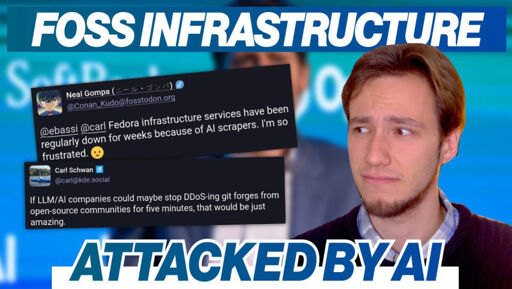Some weird, German communist, hello. He/him pronouns and all that. Obsessed with philosophy and history, secondarily obsessed with video games as a cultural medium. Also somewhat able to program.
- 22 Posts
- 48 Comments

 6·10 days ago
6·10 days agoIndeed, which is why I couldn’t recommend it without caveats and I at least don’t know of a search engine I could recommend without caveats at all.

 71·10 days ago
71·10 days agoSo, this is not a proper answer to your question. (The closest I’d give there, personally, is DDG, Qwant or Ecosia, all with their own caveats). But, I’ve been evangelizing a bit in favour of helping Mwmbl develop further.
Basically, it is an attempt to do for search engines what Wikipedia did for encyclopedic knowledge. It’s still basically just a dream with an interface that’s experimental and a search index still being built, currently seemingly bottlenecked by available (monetary) resources.
Oh, and a matrix community, where the actual community work seems to be happening.
But even though it’s an infant with not that much more than a dream at this moment - I think their project shows promise, in audacity to challenge search engine giants alone, if nothing else. Currently, I am using it as my go to “first search” search engine, helping with curating results if possible (although, truth be told, in the past weeks most searches did not give anything useful at all). I also have the index building web crawling script running on the same server as my Fediverse instances - but there is also a firefox extension for more casual volunteer crawling without a cli script.
I can’t sell this as a “proper” search engine, but still, am happy in evangelising it to anyone interested in supporting what tries to become a proper, open search engine not just on FOSS software, but FOSS principles.
 10·11 days ago
10·11 days ago!grimdank@lemmy.world would love to have this crossposted, I am sure.

 5·11 days ago
5·11 days agoYeah, remember that German philosopher? Immanuel Kant, whose last name is pronounced “cunt”? Who ended up kicking off the whole process of modern and ultimately postmodern philosophy? Who most likely had autism (non-judgemental) and some really weird habits (mostly non-judgemental, don’t hit your servants, dude) and ideas (somewhat non-judgemental, if you’ve never seen a person with darker skin in your life, don’t write about them).
It was all in the name!
Speaking of philosophers and licking cunts.

 30·12 days ago
30·12 days agoWhy was the US funding FOSS projects? That strikes me as weird, inappropriate and suspicious.
A mixture of the elements within the US that actually believed the stuff about personal rights and democracy still existing behind the more sinister realities, as well as it being in the same pot of funded projects like Radio Free Asia, Radio Liberty and the likes, which always were a mix of just outright propaganda organs, but also providing the scaffolding of free media access for some regions in the past.
So, it’s complicated, ultimately rooted in a mix of the cynical US wanting to support dissidents in other countries, and the idealist US also having people actually believing in personal freedom and privacy, even within their government/state structures.
Also, just in general, a lot of FOSS projects get funding from governments, US or otherwise. If I remember correctly ReactOS got a lot of funding from Russia, for example, because they saw a potential way to get away from Microsoft in it.
From what I gather, there was no open influence wielded over those projects, I at least don’t remember the OTF forcing a backdoor onto Tor Browser for the CIA or something like that - thankfully the open source structure makes that easier to control - but the weakness becomes apparent now, of course, because funds could now be withdrawn, as the government turned fascist.

 4·12 days ago
4·12 days agoKind of, I wouldn’t really call them an international organisation in the way I would be imagining, see how easy it was to cut their funding when national interests turned openly fascist. Their affiliation with the US government above more independent, international organisations meant, that they would support privacy and a free and open internet, as long as it helps dissidents in other, non-aligned countries, but quick to cut it, if it reaches their own doorsteps.

 23·12 days ago
23·12 days agoNot the one you answered to, but I think I can understand the idea of US funding having been a toxic source of dependency, and it being better in the long run to get money elsewhere. That “elsewhere” is a good question, though.
Just me, personally, my dream would be an international fund, carried by the UN or maybe an independent NGO, that can get funding from both private and public funds, that prioritises free internet access the way the WHO prioritises health. But I think that’s still far off.

 4·15 days ago
4·15 days agoThat is one really clever idea, that I would love to try out if I had a 3D-Printer! Of course, there is the question of how obnoxious this can get for people around you… (still worth it, even if only to fidget with while alone)

 3·17 days ago
3·17 days agoI get it, especially for users that have always been more on the lurking side (and this isn’t judging, that has always been the majority for any platform) - it can be a bit empty. As someone who has been here since 4 years ago (now I’m on a new account on my own instance), the first two years of that basically just visiting every few months out of curiosity, I can slowly see more diverse communities popping up recently, beyond the established strong points of Lemmy (FOSS, Politics, LGBTQ+ memes). And this time, unlike the first Reddit exodus, I have more confidence in them not immediately dying from lack of conviction and activity.
But of course, the sheer gargantuan user count of Reddit comes with many advantages. For many obscure topics, there will still be enough people, that a sufficient amount of “super users” congregate to provide content and moderation, so that lurkers can usually participate and still post sporadically. The latter is of course also a giant advantage, millions of people posting occasionally still provide lots and lots of posts and comments. And of course, it will take a long time and more fuckups for Reddit not simply being “the default” if you want to create a forum for a community around something. (Also, waaay too much of our knowledge is on that platform, we carelessly gave answers to help fellow humans, and now the answers are on Reddit for them to appear in countless internet searches, and for them to do with as they please.)
Where Lemmy currently has its strong suits is enthusiasm of parts of the user base, fewer issues getting noticed at all among the millions of (bot/re)-posts, and where there is activity, I’ve usually seen it panning out being able to handle actual discussions. (Though, lets not kid ourselves, of course the Reddit-like structure also still encourages circle jerks. I don’t even think that is that large of a problem, but it’s a reality.)
If you feel you end up having the energy to keep a community alive through dry spell, sure, be the change you seek, but it’s okay and understandable if you don’t want to invest the energy and work (at the moment). In that case, just stay tuned, check out the communities that pop up in all/scaled or all/new for interesting ones currently getting more traction, the Threadiverse will take a long time before it can replace a giant like reddit, but it has a few good stones for its sling up its sleeve.

 1·21 days ago
1·21 days agoSad, but, yeah, that is more than understandable, the whole database migration alone would be a massive headache to get right, I think.

 3·21 days ago
3·21 days agoWhen setting up my own here, I was debating to go for PieFed because I like the underlying features - but having had no sysadmin experience before, I went with Lemmy due to better documentation. But I am thinking about switching - can you “migrate” your instance, or did you just set up a new PieFed one and abandon the old Lemmy one?

 216·22 days ago
216·22 days agoSounds like an easy way to do unproportional damage to projects with a bit of location spoofing.

 26·26 days ago
26·26 days agoWow, I guess they have now literally reached the earliest one they could do a live action remake of. Good to know that even while things have been heating up globally, the underlying current of absolute boredom in this dystopia is going strong.

 18·26 days ago
18·26 days agoWhat is this about? This?
Haven’t been on reddit and am notoriously often living under a rock when it comes to news outside my personal interests.

 8·27 days ago
8·27 days agoI think that is utlimately valid - although I think the other options are all coming with their own problems. You will then have to instead live with the interests of tech corporations (including nonprofits who ultimately need funding) and advertisers collecting your data, whose interests will ultimately not be much less malignant - or small free software projects of a sometimes quite limited scope. The latter, I think, is also a valid niché, but will leave the overall standards of the internet to corporate interests.
Considering how the CEO here acts for Brave, in my opinion, this is not simply about him being an asshole or being politically questionable. To me - everything about him screams “grifter taking advantage of people’s legitimate concerns” - and he has a material interest in your data as well. Brave always felt to me like trying to sell and market privacy instead of proving to me, in their fundamentals, that they actually have my interests in mind.
Which is why I, personally, do not really understand choosing Brave above LibreWolf (or Tor Browse, occasionally), if privacy is your #1 priority.

 2·27 days ago
2·27 days agoOh, yes, it wasn’t a direct answer, also, I’m not the person you answered to. Ultimately, my comment was more meant as an overall addition to the discussion, building on the idea of what a solution to:
Which I think is one of the big issues with OSS projects - many are based around a very small number of people being motivated to work on something for free. And it dies if that stops.
might be.
But as answers to your two points. #1 - I have no idea where they got that from, myself #2 - I think you answered that one yourself rather well, and I wanted to build on that one.
Sorry if that was confusing, my brain is also good at confusing myself at times, can’t imagine how that is for others at times.

 41·27 days ago
41·27 days agoI can somewhat understand the overall criticism, because Librewolf - as far as my understanding goes - would be in trouble without the work being done on the code upstream.
Personally, I know that this does not exist (yet), and to some people that put privacy above everything else with a more libertarian slant, this might sound like the worst option imaginable, but my “dream” way to handle it within the current economic system would be:
Have an open source, FOSS base, web-engine and all, developed with public funds similar to public broadcasting in many countries (Bonus if carried by international organisations instead of just national. Think a UN institution like UNESCO or WHO, but focused on making the internet accessible neutrally and to all). On top of that code, projects that want to put privacy above all else could still feasibly built projects like LibreWolf (an even Brave), relying somewhat comfortably on secure fundamentals.
I know, sounds like a dream, which it is at this point. But every other solution within the current economic status quo I personally thin of, I see no chance of enshittification not always encroaching and creating crises, if not outright taking over.

 20·27 days ago
20·27 days agoOh, just to not accidentally create the wrong impression - that’s not me, I just shared the video and didn’t want to editorialise the title. If you want to give them your message (that I think is important, indeed) - you can follow the link and should be able to comment with many different activitypub account options (PeerTube itself, Mastodon, etc.) - sadly, I don’t think Lemmy is possible yet, because its design isn’t user-centric but content-centric, and it lacks some of those AP-capabilities.

















¬(Yes; libreddit is more than a read-only frontend for Reddit)